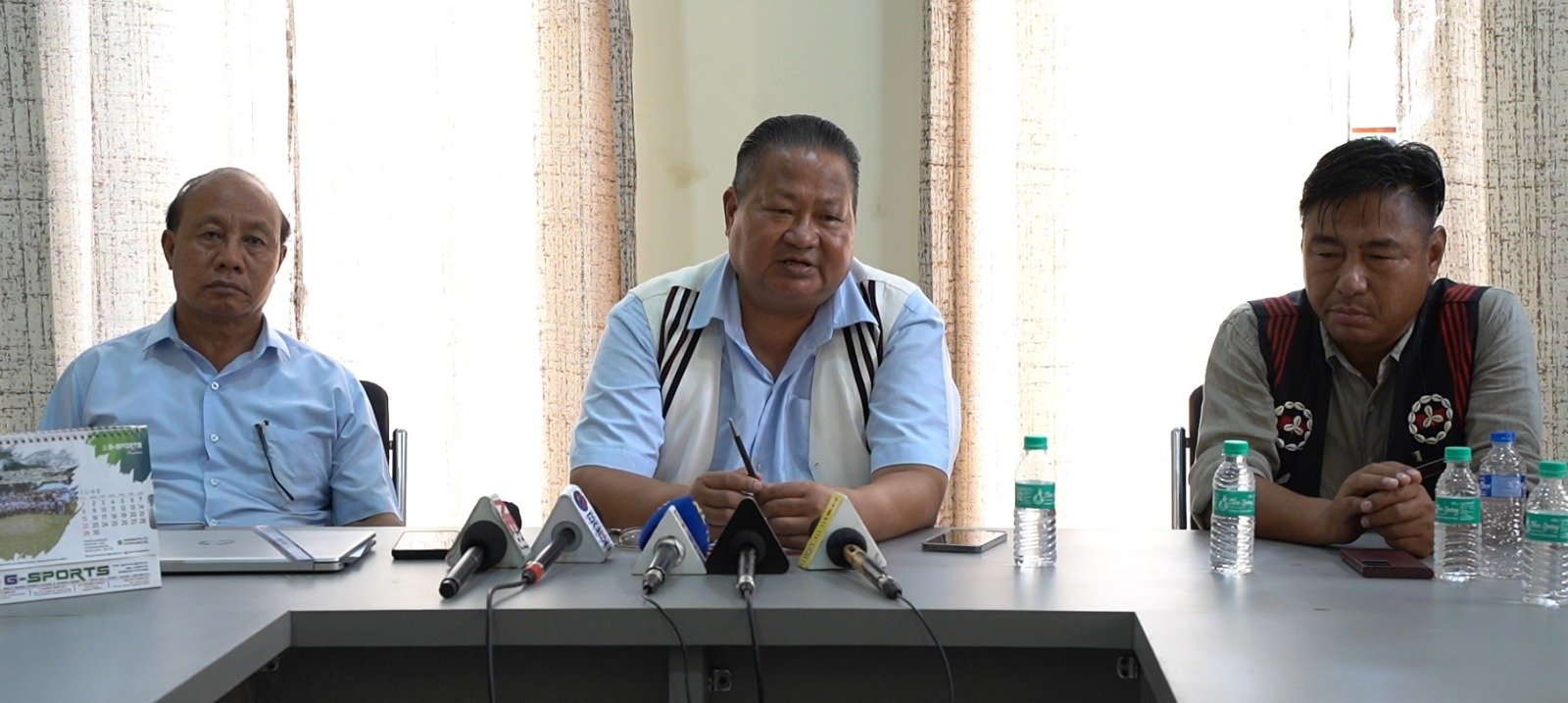DIMAPUR, JUN 25: In a pivotal move to enhance grassroots governance and address emerging local issues, the Forum for Village Councils under Chümoukedima RD Block convened a high-level, closed-door meeting on June 25, at the Village Council Hall in Chümoukedima. The meeting, hosted by the Chümoukedima Village Council, brought together Chairmen of Village Councils, Head GBs, GBs, youth and women organisation leaders from across the district.
One of the major outcomes of the over three-hour deliberation was the revival of the erstwhile Chümoukedima Area Village Councils Association (2015), now renamed as the Chümoukedima District Village Council Association (CDVCA). The rebranding aligns with Chümoukedima’s new status as a full-fledged district.
Announcing the development at a press briefing, CDVCA spokesperson Sebastian Zumvu said the association will serve as an umbrella body representing all 55 villages under the district and will operate under an interim leadership until the current Village Council terms conclude in March 2026.
The interim body will be headed by Rozouvotuo Chatsu as convenor, Vika H. Chishi as secretary, Hukavi as legal advisor, and Sebastian Zumvu as spokesperson. Senior citizens have also been inducted into an advisory board to guide the association in its formative phase.
Key Resolutions:
The CDVCA passed a series of resolutions addressing both administrative and socio-political issues:
Administrative Posts: The forum urged the Rural Development Department to post a Project Director in Chümoukedima without delay to streamline rural development activities. It also called on the School Education Department to station a District Education Officer (DEO) within the district.
VDB Governance: A resolution was passed to abolish the VDB Secretaries’ Association in the district, advocating for direct administrative control by Village Councils to promote transparency and local autonomy.
Illegal Taxation: The forum reiterated its support for the “One Government, One Tax” policy and condemned the continued extortion by underground groups, urging the State Government to take firm action against such practices.
Ceasefire and ILP-related issues: The CDVCA expressed serious concern over the alleged misuse of designated offices by Naga political groups, which, it claimed, have become hubs for illegal activities including extortion and intimidation. It called on the Government of India to strictly enforce ceasefire ground rules and enhance oversight mechanisms.
On the Inner Line Permit (ILP) system, the forum acknowledged the government’s enforcement drive but criticized the online ILP application portal as being “inconvenient and non-guarantor-friendly.” The association proposed a hybrid system allowing offline applications, and advocated the creation of a special ILP category for agricultural labourers, suggesting the validity be extended from the current 90 days to one year.
Download Nagaland Tribune app on Google Play

The CDVCA welcomed the recently notified Fifth Amendment (2025) to the Rules for Administration of Justice and Police in Nagaland, particularly the introduction of a three-tier customary court structure: Village, Subordinate, and District Customary Courts.
However, the forum stressed the need for clearly defined qualifications and conduct guidelines for presiding officers in such courts. It recommended appointing experienced Dobashis or Gaonburas as judicial heads, citing their deep understanding of customary practices.
Infrastructure and MGNREGA clarifications: Convener Rozouvotuo Chatsu took strong exception to the poor condition of roads maintained by the National Highways and Infrastructure Development Corporation Ltd (NHIDCL). He cited road negligence as the cause of several accidents and fatalities, urging the State Government to hold NHIDCL accountable.
On being asked about alleged wage deductions under MGNREGA, spokesperson Sebastian Zumvu clarified that Direct Benefit Transfers (DBT) were being followed. In certain instances, he said, beneficiaries had agreed to pool part of their wages to hire machinery or alternative labour when unable to perform manual work. No formal complaints had been received, he added.
Legal advisor Hukavi also underscored the relevance of the 1937 judicial rules in Nagaland and welcomed the government’s recent notification of Chapter 4A, paving the way for the operationalisation of customary courts. He called for speedy finalisation of rules to ensure smooth implementation.

